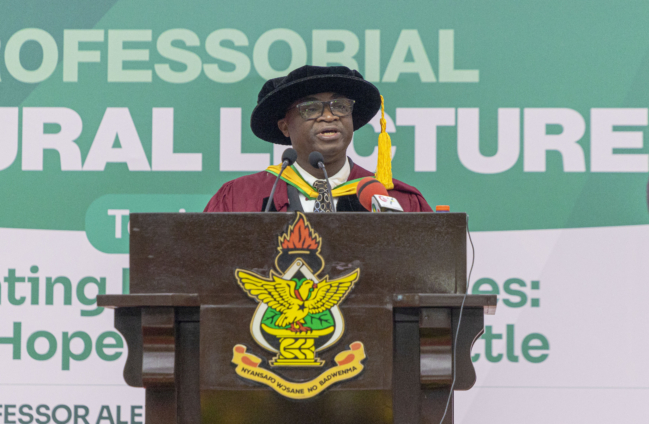KNUST Parasitologist, Professor Alexander Yaw Debrah has emphasized the importance of prioritizing Neglected Tropical Diseases (NTDs) control within national health plans.
Speaking at his professorial inaugural lecture, he stressed that adequate funding should be allocated for NTD control programs, including surveillance, treatment, and research.
"Local and endemic country governments, including the government of Ghana, must commit some percentage of health funds to fight NTDs," he stated.
The lecture, themed "Eliminating filarial diseases: A new hope for an old battle," highlighted how local and collaborative partnerships have led to combating filarial diseases in Ghana. It also covered the development of human and infrastructure capacities to sustain research and control efforts.
While advocating for the inclusion of elephantiasis patients in the National Health Insurance Scheme (NHIS), Prof. Debrah urged the government to allow victims to benefit from the Livelihood Empowerment Against Poverty (LEAP) program.
"LEAP is a social protection intervention of the Government of Ghana aimed at reducing extreme poverty among the poorest and most vulnerable in Ghana. Our research data shows that the little help we gave to the patients actually improved their quality of life. If the government extends LEAP to elephantiasis patients, it will definitely improve their quality of life," he asserted.
Professor Debrah also highlighted the need for regular assessments to ensure the effectiveness of interventions.
"Our experiences from the Yaws Eradication Program and other NTD programs, both local and international, teach us that the last 1% of patients left is as equally important as the first 99% we successfully treated. Therefore, we should be very careful not to close the books on 'eliminated NTDs.' If you are certified to eliminate a disease, it does not mean it is completely eradicated from the country. It means it is no longer a public health threat. However, if care is not taken, recrudescence can set in, and fighting to control it will be very difficult due to factors such as donor apathy and disengagement," he explained.
As digital technology continues to grow, Prof. Debrah called for expanding the use of digital and mobile technologies by community health volunteers (CHVs) to identify new and old cases.
A crucial part of his recommendations is fostering collaboration among policymakers, researchers, academic institutions, international communities, and public-private partnerships to eliminate NTDs.
Latest Stories
-
Samsung’s AI-powered innovations honored by Consumer Technology Association
14 mins -
Fugitive Zambian MP arrested in Zimbabwe – minister
32 mins -
Town council in Canada at standstill over refusal to take King’s oath
43 mins -
Trump picks Pam Bondi as attorney general after Matt Gaetz withdraws
55 mins -
Providing quality seeds to farmers is first step towards achieving food security in Ghana
1 hour -
Contraceptive pills recalled in South Africa after mix-up
2 hours -
Patient sues Algerian author over claims he used her in novel
2 hours -
Kenya’s president cancels major deals with Adani Group
2 hours -
COP29: Africa urged to invest in youth to lead fight against climate change
2 hours -
How Kenya’s evangelical president has fallen out with churches
2 hours -
‘Restoring forests or ravaging Ghana’s green heritage?’ – Coalition questions Akufo-Addo’s COP 29 claims
3 hours -
Ensuring peaceful elections: A call for justice and fairness in Ghana
4 hours -
Inside South Africa’s ‘ruthless’ gang-controlled gold mines
4 hours -
Give direct access to Global Health Fund – Civil Society calls allocations
4 hours -
Trudeau plays Santa with seasonal tax break
4 hours

